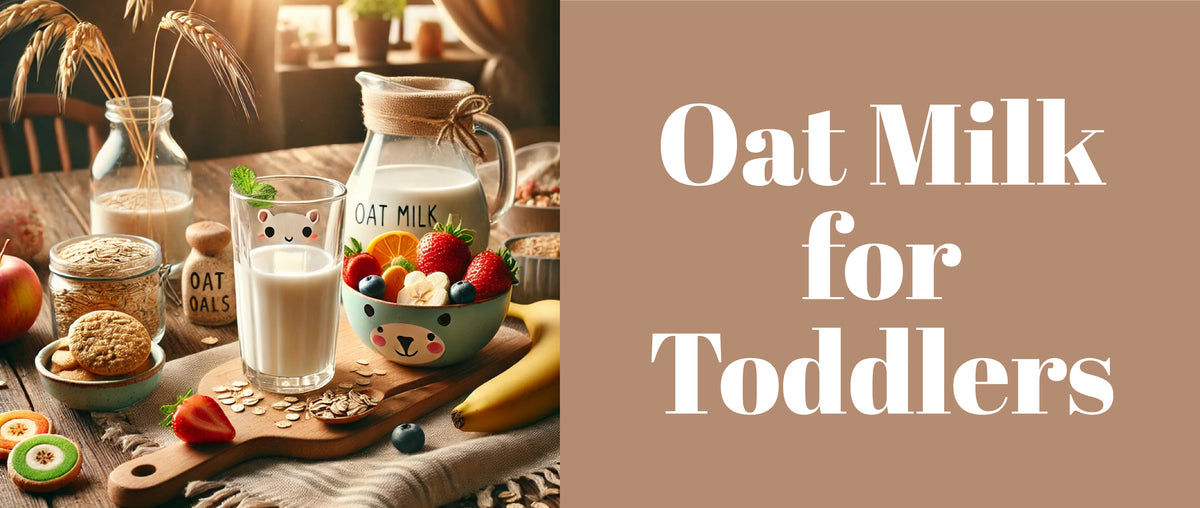Oat Milk for Toddlers
Oat milk is rapidly becoming one of the most popular plant based milk alternatives available today. This creamy, nutrient-dense beverage offers an appealing option for families seeking Vegan products and avoiding dairy due to allergies or dietary choices. Parents are increasingly turning to oat milk for toddlers as a safe, gentle milk option that provides essential vitamins, calcium, and other nutrients that support healthy living and growth.
In this guide, we explore everything parents need to know about using oat milk for toddlers—from its nutritional profile to important considerations for growing children.
Key Takeaways
- Oat milk is a nutrient-rich, vegan alternative to dairy, often fortified with essential vitamins and minerals.
- It is free from common allergens like soy, nuts, and dairy, making it ideal for sensitive diets.
- While it offers numerous benefits, oat milk has lower protein content than dairy, so it’s important to supplement with protein-rich foods.
- Choosing a fortified oat milk is essential for toddlers to support their development.
Nutritional Value of Oat Milk
One of the main reasons parents consider Oat Milk for toddlers is its nutrient profile, which can be comparable to dairy milk in some cases. Here’s a breakdown of the main nutritional components in oat milk and why they’re important for toddlers’ growth and healthy living.
Caloric Content and Carbohydrates
Oat milk provides approximately 120-130 calories per cup, primarily from carbohydrates, making it an energy-dense option suitable for active toddlers. Carbohydrates are essential for toddlers, giving them the energy needed for growth, play, and development. However, if you're aiming for healthy weight loss or managing weight gain, be mindful of oat milk's carb content and balance it with other low-calorie options, like low-calorie fruits and vegetables.

Vitamins and Minerals
Most commercially available oat milk options are fortified with essential vitamins and minerals that promote healthy lifestyle choices. Here’s a summary of key nutrients often found in fortified oat milk and their benefits:
| Nutrient | Importance for Toddlers |
|---|---|
| Calcium | Supports bone development and strong teeth. |
| Vitamin D | Aids in calcium absorption, essential for healthy bones. |
| Vitamin B12 | Crucial for blood health and brain development. |
| Vitamin A | Supports vision and immune function. |
| Iron | Important for cognitive development and immune support. |
Low Fat and Cholesterol-Free
Oat milk is naturally low in fat and contains no cholesterol, making it a great option for a heart-healthy lifestyle. Many parents concerned with creating liver healthy foods and managing fats in their children’s diet find that oat milk is an ideal option, especially since toddlers often consume fats in other forms, such as vegan butter or Cashew Butter.
Added Sugars and How to Avoid Them
Some oat milk varieties contain added sugars to enhance taste, which may not be ideal for toddlers. Look for options labeled as unsweetened or no added sugar. This not only helps manage weight but also supports healthy weight loss and prevents sugar dependency.
Also Read
Benefits of Oat Milk for Toddlers
While there are many milk alternatives available, oat milk stands out for several reasons. Here are some specific benefits of using oat milk in your toddler’s diet:
Digestibility and Gentle on Sensitive Stomachs
Many parents turn to oat milk because it’s easier on sensitive digestive systems. Unlike cow’s milk, Oat Milk lacks the lactose that can cause digestive issues, making it suitable for toddlers who are lactose intolerant.
Additionally, oat milk is plant-based and contains natural fibers, aiding in digestion. If your child has experienced discomfort with dairy, oat milk may offer relief, leading to a more comfortable digestive experience.
Allergen-Free Qualities
For families managing allergies, oat milk is a valuable alternative to common allergenic foods like dairy, soy, and nuts. Many other plant-based milks—such as almond milk and soy milk—contain common allergens, but oat milk provides a safe, gentle option for children with multiple allergies.
Easy to Incorporate into Toddler Meals
Oat milk is versatile and can be easily incorporated into toddler-friendly recipes. Here are some ideas:
- Oat Milk Smoothie: Blend oat milk with low-calorie fruits like berries and bananas to create a healthy smoothie recipe that’s rich in vitamins.
- Oat Milk Porridge: Use oat milk as the base for morning porridge, adding toppings like berries, nuts, or a small spoonful of cashew butter for a boost of protein.
- Toddler-Friendly Desserts: Replace dairy milk with oat milk in baked goods or puddings for a vegan, toddler-friendly treat.
Potential Downsides and Considerations of Oat Milk for Toddlers
While oat milk offers many benefits, there are several considerations to keep in mind before making it a staple in your toddler’s diet. Understanding the potential limitations of oat milk helps ensure a balanced approach to your child’s nutrition and growth.
1. Lower Protein Content
One key difference between oat milk and traditional dairy milk is the protein content. Cow’s milk contains around 8 grams of protein per cup, while oat milk typically has about 2 grams. Protein is vital for muscle growth, cell repair, and development, so toddlers relying heavily on oat milk may need additional protein sources in their diet. Here are some protein-rich foods to consider for balance:
- Legumes and Lentils: High in protein, perfect for soups and stews.
- Chickpeas and Hummus: A fun snack option for toddlers.
- plant based cheese like cashew cheese: Provides protein and healthy fats.
2. Importance of Fortification
Toddlers need essential vitamins and minerals, such as calcium, vitamin D, and vitamin B12, which are naturally present in dairy milk but may not be in unfortified oat milk. Fortification is crucial to ensure toddlers receive these nutrients for healthy bones, teeth, and cognitive development.
3. High Carbohydrate Content
Oat milk contains a higher carbohydrate content compared to other plant-based milks, which can lead to increased blood sugar levels if consumed in large amounts. This is important for parents to consider when balancing overall sugar intake for toddlers, especially when oat milk is part of meals that already contain carbohydrates.

Comparing Oat Milk to Other Plant-Based Milks
Parents choosing a plant-based milk for their toddler often look at options like soy milk, almond milk, and coconut milk. Each type of milk offers unique benefits and considerations, making it essential to choose the right fit based on nutritional needs, taste, and allergen concerns. Here’s a comparison to help you decide:
| Milk Type | Calories | Protein | Fat | Sugars | Calcium (if fortified) | Allergen Concerns |
|---|---|---|---|---|---|---|
| Oat Milk | ~120 | ~2g | ~3g | ~7g | ~300mg | Low (gluten in some brands) |
| Soy Milk | ~80-100 | ~7g | ~4g | ~1g | ~300mg | Contains soy |
| Almond Milk | ~30-50 | ~1g | ~2.5g | ~0g | ~300mg | Contains tree nuts |
| Coconut Milk | ~45 | ~0g | ~4.5g | ~0g | ~300mg | Low allergen risk |
Conclusion: Is Oat Milk the Right Choice for Your Toddler?
Choosing oat milk as a milk alternative for toddlers offers several benefits, including its digestibility, allergy-friendly nature, and the ease with which it can be incorporated into meals. For families seeking Vegan Products in india or looking to avoid dairy, oat milk is an accessible and nutrient-rich choice, especially when fortified with essential vitamins and minerals.
However, as with any dietary choice, it’s essential to provide a well-rounded diet by including other sources of protein, healthy fats, and nutrients to support overall growth and healthy living. With a thoughtful approach and careful selection of the right oat milk, parents can offer their toddlers a tasty, versatile option that aligns with a balanced, plant-based lifestyle.
Do you enjoy vegan food? We have a list of vegan restaurants in India to help you find delicious options in your area!










